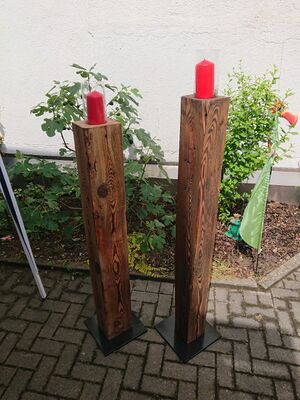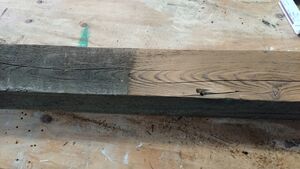Project:Wood Beam Candlestick: Difference between revisions
NitramLegov (talk | contribs) First version - needs more description |
m Category:Lighting |
||
| (5 intermediate revisions by one other user not shown) | |||
| Line 1: | Line 1: | ||
{{ProjectInfoBox|project title=Wood Beam Candlestick|status=done|initiator={{NL}}|materials=[[Wood]]|tools=[[Handheld Router]], [[Chop Saw]], [[Handheld Sander]]|image=Beam | {{ProjectInfoBox|project title=Wood Beam Candlestick|status=done|initiator={{NL}}|materials=[[Wood]]|tools=[[Handheld Router]], [[Chop Saw]], [[Handheld Sander]]|image=Wood Beam Candlestick - Done.jpg|date=June 2022}} | ||
If you ever get your hands on an old wood beam, this is the perfect base for some nice upcycling project. | If you ever get your hands on an old wood beam, this is the perfect base for some nice upcycling project. | ||
| Line 5: | Line 5: | ||
In this project, {{NL}} made a candlestick out of an old wood beam coming from his sisters barn. | In this project, {{NL}} made a candlestick out of an old wood beam coming from his sisters barn. | ||
If you want to make your own, please follow the steps | If you want to make your own, please follow the steps below: | ||
== Cutting == | ==Cutting== | ||
Of course, the wood beam has to be cut to size. A length of 130 cm turned out to be a good length. | Of course, the wood beam has to be cut to size. A length of 130 cm turned out to be a good length. | ||
Since the wood beam had a size of ~15{{X}}15 cm, the only saw which could have cut through it in one cut would have been our [[bandsaw]]. However, the beam was just too large to use the bandsaw for this. Therefore, I decided to use the chop saw and cut the beam in multiple cuts. To do so, the following turned out to be successfull: | Since the wood beam had a size of ~15{{X}}15 cm, the only saw which could have cut through it in one cut would have been our [[bandsaw]]. However, the beam was just too large to use the bandsaw for this. Therefore, I decided to use the chop saw and cut the beam in multiple cuts. To do so, the following turned out to be successfull: | ||
# As always, mark the spot you want to cut and put the beam to the correct position on the chop saw | #As always, mark the spot you want to cut and put the beam to the correct position on the chop saw | ||
# Cut approximately half way through the beam | #Cut approximately half way through the beam | ||
# Turn the beam by 90 degrees | #Turn the beam by 90 degrees | ||
# Check that the beam is in the correct position. You can do so by pushing the saw blad down ''while turned off'' and check that it smoothly fits in the cut from step 2. | #Check that the beam is in the correct position. You can do so by pushing the saw blad down ''while turned off'' and check that it smoothly fits in the cut from step 2. | ||
# Cut approximately half way through the beam | #Cut approximately half way through the beam | ||
# Repeat steps 3 to 5 until done | #Repeat steps 3 to 5 until done | ||
== Sanding == | ==Sanding== | ||
Since those old wood beams are usually covered with dirt and dust, cleaning them was a neccessary step. If you want to have beams looking like new ones, you could use the [[Jointer-Planer]] to take some material off. However, in this project, the used look was preferred, so I just sanded the beams using our [[Sanders]] and 80 [[Sandpaper]]. | Since those old wood beams are usually covered with dirt and dust, cleaning them was a neccessary step. If you want to have beams looking like new ones, you could use the [[Jointer-Planer]] to take some material off. However, in this project, the used look was preferred, so I just sanded the beams using our [[Sanders]] and 80 [[Sandpaper]]. | ||
[[File:Beam | [[File:Wood Beam Candlestick - sanding.jpg|none|thumb|Sanding of the wood beam - left is original, right is sanded]] | ||
== Routing == | ==Routing== | ||
[[ | Since the beam does not have a hole for the candle glass by nature, I had to put one in myself. A very manual option to do this would be to cut multiple holes using a [[Forstner Bit|forstner bit]] and then remove the remaining wood using a [[chisel]]. However, this seemed to be a pain, so I decided to use the [[Handheld Routers|handheld router]] for this: | ||
[[ | |||
[[ | |||
# Create a jig using the [[Laser Cutter|laser cutter]] (in my case, this was just a circle with a diameter of 10cm) | |||
[[File:Wood Beam Candlestick - | # Glue the jig on the beam using double sided tape | ||
# Use the router with a flush mill bit to start removing wood - leave a few milimeters space at the border | |||
# Once you have hit a depth that the flush mill bit would hit the jig with the ball bearing, remove the wood you have left at the border | |||
# Go as deep as you desire | |||
<gallery> | |||
File:Wood Beam Candlestick - Routing jig.jpg | |||
File:Wood Beam Candlestick - Routing 1.jpg | |||
File:Wood Beam Candlestick - Routing glass in jig.jpg | |||
File:Wood Beam Candlestick - Routing done.jpg | |||
</gallery> | |||
== The Stand == | ==Glacing== | ||
Since the wood beam candlestick will mainly be used outside, it needs at least some rough protection from the weather. For this, I have just got regular glace for the outside at Bauhaus and applied this to the wood beam. | |||
Make sure to put the wood beam on some pyramids when applying the glace. I have used some leftover 3D-printed ones I have found at the plastic recycling corner. However, there are also some proper painting pyramids available at the painting supplies as well.<gallery> | |||
File:Wood Beam Candlestick - glacing.jpg | |||
File:Wood Beam Candlestick - glaced.jpg | |||
</gallery> | |||
==The Stand== | |||
Since everything else in this project was upcycled, the stand was also made from some metal junk. To ensure it also survives the outdoors, it was prepared as follows: | |||
# Grind it to remove rust | |||
# Paint it with some outdoor safe metal paint | |||
# Drill the holes needed to screw the wood beam onto it | |||
# Screw the wood beam on the metal plate | |||
<gallery> | |||
File:Wood Beam Candlestick - Stand Initial.jpg | |||
File:Wood Beam Candlestick - stand drilling.jpg | |||
File:Wood Beam Candlestick - stand drilled.jpg | |||
File:Wood Beam Candlestick - stand painted.jpg | |||
File:Wood Beam Candlestick - stand test.jpg | |||
</gallery> | |||
[[Category:Lighting]] | |||
[[Category:Upcycling]] | |||
[[Category:Woodworking]] | |||
Latest revision as of 18:42, 3 September 2023
| ProjectInfoBox Wood Beam Candlestick | |
|---|---|

| |
| Status: | done |
| Release Date: | June 2022 |
| Initiator: | Martin |
| Materials Used: | Wood |
| Tools Used: | Handheld Router, Chop Saw, Handheld Sander |
If you ever get your hands on an old wood beam, this is the perfect base for some nice upcycling project.
In this project, Martin made a candlestick out of an old wood beam coming from his sisters barn.
If you want to make your own, please follow the steps below:
Cutting
Of course, the wood beam has to be cut to size. A length of 130 cm turned out to be a good length.
Since the wood beam had a size of ~15 × 15 cm, the only saw which could have cut through it in one cut would have been our bandsaw. However, the beam was just too large to use the bandsaw for this. Therefore, I decided to use the chop saw and cut the beam in multiple cuts. To do so, the following turned out to be successfull:
- As always, mark the spot you want to cut and put the beam to the correct position on the chop saw
- Cut approximately half way through the beam
- Turn the beam by 90 degrees
- Check that the beam is in the correct position. You can do so by pushing the saw blad down while turned off and check that it smoothly fits in the cut from step 2.
- Cut approximately half way through the beam
- Repeat steps 3 to 5 until done
Sanding
Since those old wood beams are usually covered with dirt and dust, cleaning them was a neccessary step. If you want to have beams looking like new ones, you could use the Jointer-Planer to take some material off. However, in this project, the used look was preferred, so I just sanded the beams using our Sanders and 80 Sandpaper.

Routing
Since the beam does not have a hole for the candle glass by nature, I had to put one in myself. A very manual option to do this would be to cut multiple holes using a forstner bit and then remove the remaining wood using a chisel. However, this seemed to be a pain, so I decided to use the handheld router for this:
- Create a jig using the laser cutter (in my case, this was just a circle with a diameter of 10cm)
- Glue the jig on the beam using double sided tape
- Use the router with a flush mill bit to start removing wood - leave a few milimeters space at the border
- Once you have hit a depth that the flush mill bit would hit the jig with the ball bearing, remove the wood you have left at the border
- Go as deep as you desire
Glacing
Since the wood beam candlestick will mainly be used outside, it needs at least some rough protection from the weather. For this, I have just got regular glace for the outside at Bauhaus and applied this to the wood beam.
Make sure to put the wood beam on some pyramids when applying the glace. I have used some leftover 3D-printed ones I have found at the plastic recycling corner. However, there are also some proper painting pyramids available at the painting supplies as well.
The Stand
Since everything else in this project was upcycled, the stand was also made from some metal junk. To ensure it also survives the outdoors, it was prepared as follows:
- Grind it to remove rust
- Paint it with some outdoor safe metal paint
- Drill the holes needed to screw the wood beam onto it
- Screw the wood beam on the metal plate










